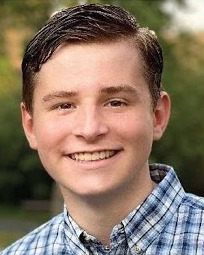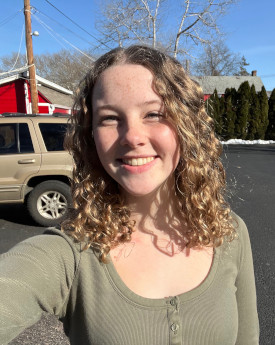Have you ever wondered what it’s like to be a kid with a rare autoimmune disease?
In this special episode, the host of The CARRA Podcast Claudette Johnson, who is a teenager living with a rare autoimmune disease, interviews another teenager who has a rare autoimmune disease about their experiences with school, sports, friends, medical treatments, and research.
Spencer Ableman shares his journey with vasculitis, from a terrifying and unexpected health crisis to learning to embrace life with new challenges. Spencer shares his experiences on everything from competing in a cross-country race with a port in his chest to explaining his condition to other teenagers. It hasn’t been an easy path, but he has found some silver linings – from having insider knowledge in his AP Bio class to seeing his friends waiting at the finish line of his first cross-country race.
“Even though it may seem like you’re in the dark there’s a light at the end of the tunnel and you just got to keep your head up if you want to see it,” says Spencer, who spoke at CARRA’s Annual Scientific Conference in 2023.
Check out the conversation between these two remarkable teens!
I remember you shared your incredible story at CARRA’s Annual Conference about a year ago. Could you tell us the story from the beginning of how you were diagnosed?
I was on vacation for a family reunion in Idaho. While I was there, I was getting super-duper sick, and it was like nothing I’d really ever felt before. I was just so fatigued. At one point I like couldn’t even go up the stairs and my grandpa happened to have a pulse oximeter and he just checked me just in case. And I think I was at 70 at the time, which is super low. You’re supposed to be always at a hundred. So, I rushed quickly to an ER, and I was at 60 by the time we got there.
They instantly gave me pressurized oxygen. It was just this little hospital, and they didn’t really know what was going on with me, so they sent me to a bigger hospital still in Idaho, but they just could not figure out what was happening. So, I got life-flighted to Primary Children’s Hospital in Utah. They were able to figure out within the first few days that it was something called vasculitis.
I have two types of vasculitis. One is called MPA and one is called anti-GBM. Basically, it’s just like inflaming of your blood cells. So, my lungs were bleeding. They figured out on the life flight, I think, that I was having a lung hemorrhage. So, they got that fixed with the pressurized oxygen. And they put me on a bunch of prednisone and all that stuff. And I ended up staying there 17 days.
The doctors also put a port in my chest for plasmapheresis. The port stayed in for like a couple months after just in case, but they ended up taking that out. So that was just the beginning and then I found out it was the chronic disease, and I would have it forever.
So, you’re in a plane, you have all of this crazy medical stuff happening to you. What was going through your mind?
I was pretty scared. I was just like, “what’s going to happen once we touch down?” In my head, I kept forgetting like where we were going because I was so low on blood cells.
It was kind of just a crazy feeling because I (and everyone in my family) have been generally, very healthy, and I have not really experienced much of the doctor side of things. My grandpa is a doctor, but I hadn’t really ever been a patient. So, I was just pretty scared and confused because I had just been thrown into this all of a sudden.
I was diagnosed very young (at the end of third grade), so I know what it’s like to find out you have to live with something like this for the rest of your life. It can be really hard. What do you think has helped you come to terms with it?
For me, I think it’s just been like, embracing it almost. Knowing that there’s not really a way to avoid it. You can try all you want, but eventually you’re still going to have to take meds and go to the doctor and all that. Also, being part of the very small community that does have this disease and going to the CARRA conference and all those things have really helped me deal with it.
At the CARRA conference, I met a couple doctors who work specifically on MPA research, and it was just amazing to see people who are working specifically on my disease – that community was just awesome to see.
Have you taken part in any research?
For the research that I have done, they’ll be like, “Would you be down to do this survey or let us take a blood draw so that our research facilities can have that?” I’m always like, “yeah, sure,” because I know how much that helps. It’s been awesome to do that.
For any kids listening to this who are going through similar things, what would say to them?
I’d say keep your head up. This is something in life where you can either make or break how you think about stuff. You could be like, “oh my life is over, it’ll never be normal again.” Or, you can try your hardest to fight through it or try to be normal and just having a mindset of like, “I will get through this; there will be brighter days ahead.”
For me it was like a really bad situation. Everything was just kind of thrown off the rails. But in my head, I kept telling myself, “One day, I think I can get back to normal.” Even if you know there’s other big things that that are ahead of you, just know that you can still have a normal life.
You’re just living your life knowing that you’re not quite like the other kids. How do you think that’s affected you?
It’s had its ups and downs for sure. When I first got back from the hospital, I still had a port in just in case they wanted to do some more of the plasmapheresis. It basically just replaced all my blood with just new good blood, basically, which was super weird. So I have this port in, and this is mid-summer, so I couldn’t swim with it. When we’d have beach days, I’d just be like, sitting on the beach and wouldn’t be able to go in.
Before I got sick that summer, I was doing this football camp and I was wanting to play football that fall, but that window completely closed because with the port, I obviously couldn’t play and I was very out of shape.
There’s stuff like that where I’m like, “Oh dang, I missed out on this.” But then there’s also times like in my AP bio class when because I had this, I knew a lot of stuff in class just because of past medical experiences. That just kind of made me feel good because even though it’s difficult, you can still find things that are positive.
I’ve gone into school with IVs before. For kids going through this and having this thing that’s different about them, what would you say to them?
I’d say embrace it. If people ask you about it, be down to answer stuff. At first ,I would wear like my hoodies really high, just so people couldn’t see my port. But then I was like, well, screw it. Like we all have our own little things about us. So, I’d wear my shirts normally. Then people started coming up to me and they’d be like, “what’s that?”
So, it’d kind of be like a conversation starter. Being able to openly talk about it is kind of a good thing because I mean, your whole life, you’re going to have to talk to doctors about your disease and all this. Being open to your friends and people at school about it just makes it easier.
I feel like most people will say, “oh, that’s interesting.” But the people who will be like, “oh, that’s weird,” – those people aren’t worth talking to anyway. So, I’d say, I’d say just embrace it.
Was there any support or anything at school that really helped you?
Well, I have this pretty cool story from my cross-country season. I have this friend who suggested I should run cross country, I was like, “oh, that’d be cool.” Then the whole vasculitis thing happened, and my body was just not ready for it, but I still did it anyway. I thought it might be a good way to just get back into my routine.
The first cross-country meet, I still had my port in, so I was not very fast. I was super slow, and I was pretty overweight from all the Prednisone, just wanting to eat all the time. So, my first meet, it was just this really short meet, but I had to walk so much.
I was going super slow. And I think I was last on the team. My mom told me this later, one of my friends was like, “Everyone, let’s go watch Spencer finish, let’s cheer him on!” So, at the end, all these people were cheering for me. And even though I was in last place, and it just felt super good to just see that support, even though I looked different, I was slow, and I had the port in. My friends were still there for me to see me finish. So that was just a really awesome experience.
There was so many other times when people were really there for me. I hosted a vasculitis fun run event with our local charity, called Brett Hack Vasculitis Charity, and a bunch of my friends went to that, and it was that same cross country friend group. So, having them always be there for me has been really cool.
About Spencer Ableman

Spencer Ableman is a high school student from Minnesota who lives with two forms of vasculitis. Spencer, who had always been a healthy kid, experienced a sudden and unexpected health crisis while on a family vacation as a young teen that led to a diagnosis of this rare autoimmune disease. Despite facing this very tough health challenge, he has competed in high school cross-country and has been actively involved in volunteering to raise money for a local vasculitis charity. He was honored as a Vasculitis Foundation Patient Hero in 2022.
About Claudette Johnson

Claudette is a Junior at Montclair High School in Montclair, New Jersey. She was diagnosed with Localized Scleroderma at age nine. She enjoys playing piano, reading and competitive diving. Claudette is also an incredible advocate and innovator. She is the host of The CARRA podcast, and she created an award-winning video called “The Land of Rare Disease.”
About Emily Nguyen

Emily is a Sophomore at New York University studying Film and TV Production. She was diagnosed with Lupus Nephritis at age eight. Since her diagnosis 12 years ago, Emily has been a lupus advocate—raising money, spreading awareness and supporting other patients afflicted by the disease. In her free time, she enjoys creating films, painting, baking and traveling.
We want to hear from you! Send us a message to let us know your thoughts, suggestions, or any ideas for future topics.